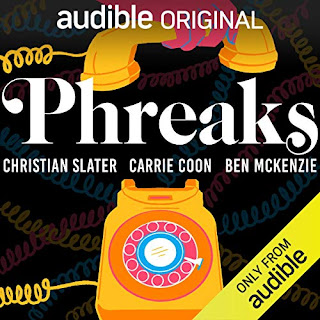Occasionally, I'll pick up a title on Audible that I wouldn't ordinarily listen to or care about, and the radio play Phreaks by Matthew Derby is one such. Granted, it didn't take much to twist my rubber arm because one of my favourite actors lends his vocal talents to the production. If you ever watched Gotham, you'll know and love Ben McKenzie as much as I do. Of course the added tease (and here I'm wearing my 1990s on my sleeve) is that Christian Slater also has a decent part.
This full-cast radio play that is set in 1970 grabbed my attention from the get go. We meet teen Emma Gable, who is obsessed with making random phone calls so she can chat with whoever picks up. Despite her disability (or perhaps because of it) she is plucky and possesses a sharp tongue. These phone calls are her idea of entertainment and a link to a world beyond her current life, and honestly, I don't blame her. If you're blind, your parents are troubled, and you've got little else to keep you occupied after school, then why the hell not. Except it's all fun and games until she stumbles onto a bunch of people who use the phone systems to run what was then (very) basic hacks.
We also meet Bell security agent Bill Connolly (McKenzie – he's such a typical detective type down to his voice) who's chafing at how his career is going nowhere. That he's stuck working for Bell when he has greater aspirations ... and it looks like he's going to spend most of the play grumbling until he gets a whiff of this group of hackers, and figures that Emma is the key he needs to unlock the problem.
While there're no high-octane car chases, this is still a thrilling listen, and the characters you encounter are fascinating and flawed. I love how Emma, ever the misfit, garners a degree of social clout thanks to her skill with gaming the phone system. Emma's father (voiced by Slater), is his own worst enemy, and I'd cheerfully like to slap him upside the head for the way he treats Emma's mum, who is clearly quite ill thanks to the hazards of her job.
Beneath the slow burn of the gradually evolving plot, we are faced with the small-town tragedies that everyday people face, drawing to a bitter-sweet conclusion. I admit that I know very little about hacking and how the phone systems worked back then, so it was fascinating having a glimpse into an era that was the reality for so many people less than a decade before I popped out of my mum's womb. Our world is very different now, and Phreaks feels like a little bit of a time capsule for those who might be curious.








